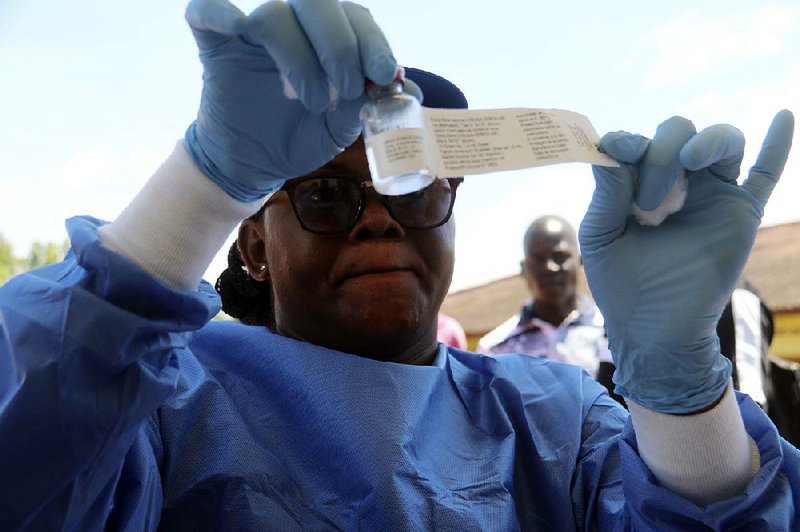The United States has pledged to provide $8 million to support the global response to the growing Ebola outbreak in Congo, officials said Tuesday.
Health and Human Services Secretary Alex Azar announced the $7 million commitment at the World Health Assembly in Geneva, adding to an initial $1 million pledge last week.
Meanwhile, Congo's health ministry announced six new confirmed Ebola cases and two new suspected cases Tuesday as vaccinations entered a second day in an effort to contain the deadly virus in a city of more than 1 million.
Dozens of health workers in the northwestern provincial capital, Mbandaka, have received vaccinations amid expectations that some will be deployed to the rural epicenter of the epidemic. Front-line workers are especially at risk of contracting the virus, which spreads by contact with the bodily fluids of infected people, including the dead.
"In the next five days 100 people must be vaccinated, including 70 health professionals," Health Minister Oly Ilunga said. "The priority of the government is to ensure that all these brave health professionals can do their job safely."
Congo's health ministry said there are now 28 confirmed Ebola cases, 21 probable ones and two suspected. The six new confirmed cases were in the rural Iboko health zone, it said. Of the confirmed Ebola cases, 14 are in Iboko, 10 are in Bikoro where the outbreak began and four are in the Wangata area of Mbandaka.
The death toll from hemorrhagic fever stands at 27, with three of them confirmed as Ebola. Two of the Ebola victims were nurses, one in Iboko and the other in Bikoro.
"Concerned about Iboko as access remains difficult," Dr. Peter Salama, the World Health Organization's emergency response chief, said Tuesday on Twitter. Roads in the region are unpaved and infrastructure is poor.
The WHO said 33 people received the first vaccinations Monday, including a few people in two communities of Mbandaka. More than 7,500 doses are available in Congo, WHO said Monday, and another 8,000 doses will be available in the coming days.
WHO officials estimate that outbreak-control efforts will cost $26 million over the next three months. As of Friday, the WHO had received commitments for about $9 million.
"So we are about 17 million short," Salama said at a news conference in Geneva on Friday. That may sound like a considerable amount, he said, but not compared with the Ebola epidemic in West Africa, which cost between $3 billion and $4 billion. "So this is a relatively small investment to stamp out a small outbreak quickly, for a major gain in lives saved, but also in dollars saved," he said.
Some global health experts have expressed concern privately that the U.S. response would be minimized given President Donald Trump's disparaging and isolationist comments about Ebola during the 2014 epidemic. He complained about two sick American health workers being flown back to the United States for treatment and said they should not be brought into the country.
But the U.S. response so far appears to be appropriate for this outbreak, experts say.
"I don't see any evidence that the president's former comments about Ebola have impacted the U.S. response," said one global health expert, who spoke on the condition of anonymity to speak candidly.
Thomas Inglesby, director of the Johns Hopkins Center for Health Security, said: "My sense is that while they have not been too public with what they are doing yet, they are in fact doing a lot and will be sending teams into the field as per the requests of DRC and WHO." He used an acronym for Congo's formal name, Democratic Republic of the Congo.
On Friday, the U.S. Agency for International Development said it has provided an initial $1 million to the WHO to combat the outbreak. That preceded Azar's $7 million commitment Tuesday.
Those funds would be separate from the $252 million in unused funds remaining from U.S. reaction to the 2014 Ebola epidemic that the administration wants Congress to cut.
The agency is also sending 2,000 personal-protective-equipment kits, laboratory materials for diagnostic testing, and other technical support. The Centers for Disease Control and Prevention has already mobilized its country office in Congo, which includes several experts who had extensive experience handling the 2014 West Africa epidemic.
The CDC has also assembled a team of about a dozen experts who are planning to deploy to Congo within days. Their expertise includes infection control, contact tracing and emergency operations management.
Information for this article was contributed by Lena H. Sun of The Washington Post; and by Saleh Mwanamilongo and Carley Petesch of The Associated Press.
A Section on 05/23/2018
